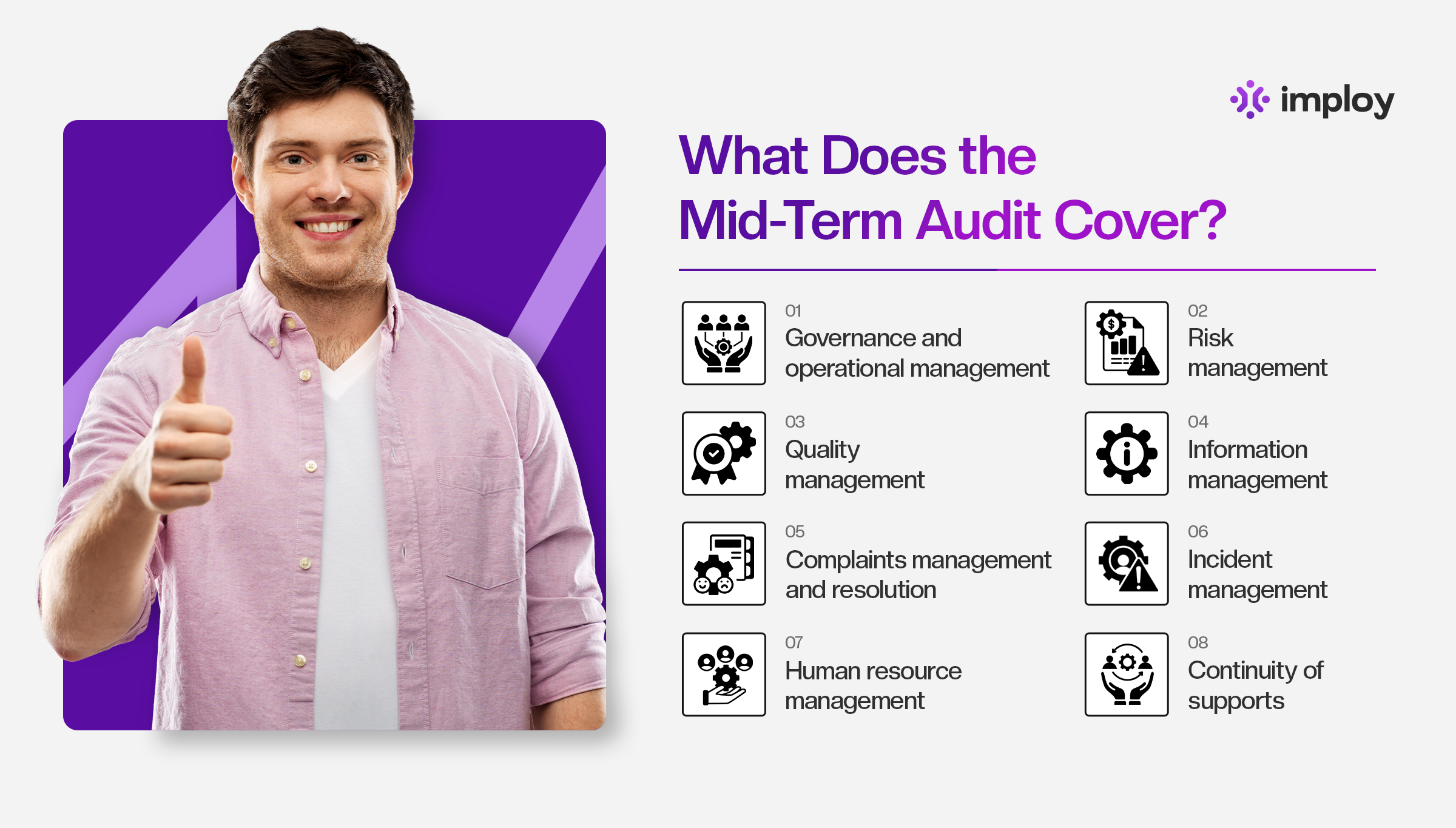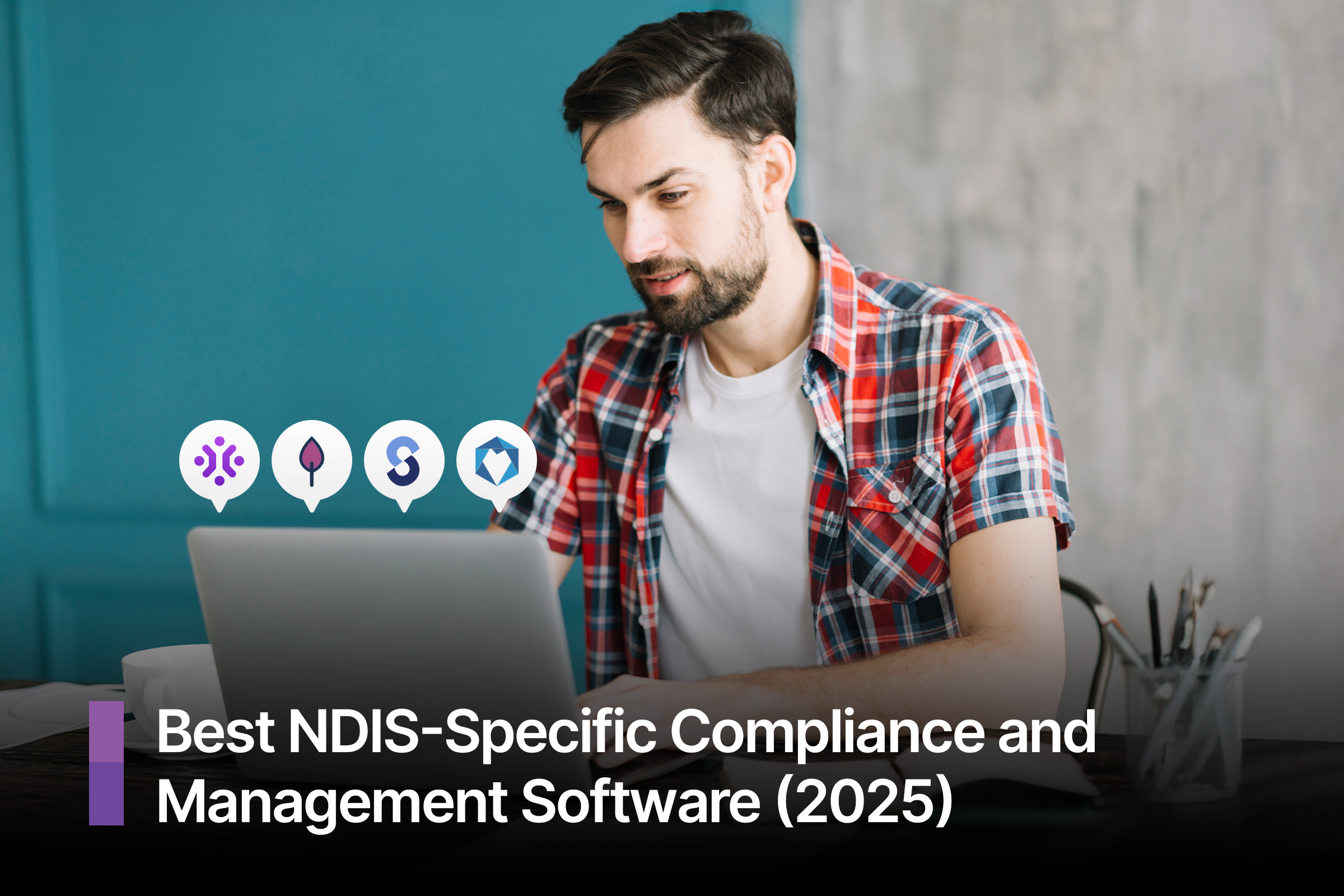NDIS Mid-Term Audit Guide: Compliance & Checklist
Learn how to pass your NDIS mid-term audit with confidence. Includes compliance checklist and preparation tips.

If you are an NDIS provider delivering higher-risk or complex supports, audits are a vital part of maintaining your registration. Among the most important checkpoints is the mid-term audit, designed to ensure your organisation continues to meet the NDIS Practice Standards and deliver safe, high-quality support to participants.
In this blog, we’ll explore the essentials of the mid-term audit. We’ll start by explaining what it is and who it applies to, before breaking down what the audit assesses in practice. We’ll also look at some of the common challenges providers face during the process and outline practical steps to help you prepare effectively.
What is a Mid-Term Audit?
A mid-term audit is a mandatory compliance review conducted roughly 18 months into your 3-year certification cycle. It applies to providers who completed a certification audit and aims to verify that your organisation continues to comply with the NDIS Practice Standards.
According to the NDIS Commission, the mid-term audit:
- Focuses on governance and operational management.
- Checks standards previously flagged as requiring a corrective action plan.
- Includes any additional standards the Commission requires
Exemptions: Mid-term audits do not apply to:
- Individuals or partnerships registered only for early childhood early intervention support.
- Providers registered solely to deliver Specialist Disability Accommodation (SDA).
- Transitioned providers.
For full audit types and rules, see the NDIS Commission guide to audit types.
Preparing for Your Mid-Term Audit
Start preparing around 12 months after registration to allow enough time for a smooth process:
- Engage an Approved Quality Auditor: Use the NDIS Commission’s Find an Auditor tool to select an auditor.
- Confirm audit scope and schedule: Discuss with your auditor which modules will be reviewed and set the audit timeline.
- Review the NDIS Practice Standards: Focus on the Core Module - Provider governance and operational management.
- Gather documentation and evidence: Examples include policies, risk registers, incident logs, staff training records, and participant files.
- Inform staff and participants: Let them know auditors will be visiting and may observe practices.
- Coordinate with your Client Services Officer (CSO): They will confirm your sites, services, staff, and participant numbers, which determine the audit duration and cost.
Before your official mid-term audit, it’s smart to conduct an internal audit to identify compliance gaps early. You can follow our detailed process in the NDIS Internal Audit Guide.
You can also download our Responding to NDIS Audit Guide Template to help your team prepare evidence efficiently.
During the Audit
During the audit itself, auditors will review your documentation, interview staff and participants, and possibly conduct site visits. If they identify any non-conformities - whether major or minor, they will request further evidence or an improvement plan.
Responding promptly is critical. Demonstrating that you can quickly address issues shows your organisation’s commitment to continuous improvement and compliance with the NDIS Practice Standards. Even minor delays in responding can affect the outcome of the audit.
How the Auditor Assesses Compliance:
During the audit, the auditor will:
- Review your policies, procedures, and documentation for governance, risk, incident, and complaints management.
- Examine staff and participant records to confirm compliance.
- Conduct interviews with staff and participants (with consent) to verify practices in action.
- Check that your organisation meets all Core Module requirements.
- Review any relevant Supplementary Modules, such as high-intensity supports or behaviour support.
- Conduct site visits to observe operations and ensure compliance with the NDIS Practice Standards.
This section gives providers a clear, practical picture of what to expect, helping them align preparation with actual auditor activities.
What Does the Mid-Term Audit Cover?

The mid-term audit primarily evaluates whether your organisation is meeting the governance and management standards outlined in Part 3 of Schedule 1 of the NDIS Practice Standards. Specifically, auditors will check how effectively you are managing:
- Governance and operational management: the overall leadership and systems in place.
- Risk management: identifying, managing, and reducing risks to participants and staff.
- Quality management: continuous monitoring and improvement of service delivery.
- Information management: secure handling and use of participant and organisational data.
- Complaints management and resolution: how you handle, record, and resolve complaints.
- Incident management: your approach to reporting, documenting, and responding to incidents.
- Human resource management: staff recruitment, training, and ongoing capability.
- Continuity of support: ensuring participants continue receiving services, even during staff absences, emergencies, or other disruptions.
These areas form the foundation of safe, effective, and participant-focused service delivery. Auditors want to see evidence that your systems aren’t just on paper, they must be actively implemented in day-to-day operations.
Finalising Your Mid-Term Audit
The NDIS registration cycle runs for three years, and your mid-term audit must commence no later than 18 months after your approval date.
To successfully finalise the process, you’ll need to ensure your auditor submits the final audit report to the NDIS Commission by the deadline. If the audit identified any non-conformities, you’ll also need to provide corrective actions or improvements within the required timeframe.
Promptly addressing outstanding issues not only secures your compliance but also demonstrates that your organisation is proactive about maintaining quality standards. This reduces the risk of penalties, suspension, or cancellation of your NDIS registration.
Common Challenges Providers Face
Many providers run into similar issues during the mid-term audit. Being aware of these challenges in advance gives you the chance to prepare and reduce risks. Here are some common problems and practical ways to address them:
By staying on top of policies, records, and staff training, providers can avoid these common pitfalls. This proactive approach not only makes the audit process smoother but also strengthens compliance and service quality year-round.
How Imploy Helps Providers With Mid-Term Audits?
Preparing for an NDIS mid-term audit can feel overwhelming, especially with the need to gather extensive documentation, evidence, and demonstrate ongoing compliance. Staying audit-ready year-round is not just a best practice, it’s essential for maintaining registration and delivering high-quality services. This is where imploy can make a real difference for providers.
- Centralized Compliance Management
imploy acts as a single, secure hub for all your compliance-related information. You can store policies, procedures, risk registers, incident and complaint logs, and staff training records in one organized system. This centralization ensures that critical documents are always accessible and easy to locate when an auditor requests them. - Automated Reminders & Alerts
Managing compliance dates manually can be stressful. imploy automates reminders for training renewals, policy reviews, and other key compliance milestones. This helps ensure nothing is overlooked, reducing the risk of non-compliance. - Audit-Ready Templates & Checklist
imploy provides pre-built NDIS-compliant templates and internal audit checklists. These tools simplify preparation, making audits less time-consuming and more consistent across your organisation. Staff can follow a clear process for maintaining records and documenting compliance. - Evidence Collection & Reporting
During an audit, time is critical. imploy allows you to quickly collate documents, reports, and records, minimizing disruption to daily operations. Auditors can access the evidence they need efficiently, improving the overall audit experience.
- Continuous Monitoring & Improvement
Compliance isn’t just about passing audits, it’s about maintaining high standards year-round. imploy tracks trends in compliance, highlights potential gaps, and supports continuous improvement, helping your organisation stay proactive rather than reactive.
With imploy, providers gain a structured, reliable way to manage compliance, reduce stress during audits, and focus on delivering exceptional care. By streamlining preparation and keeping you consistently audit-ready, imploy ensures that mid-term audits are no longer daunting but manageable milestones in your ongoing commitment to quality.
Final Thoughts
The NDIS mid-term audit is a key milestone for providers delivering higher-risk or complex supports, ensuring your organisation operates safely and in line with the NDIS Practice Standards. Early preparation helps identify and address gaps, reducing stress and ensuring compliance. By maintaining accurate policies, procedures, and training records, providers can demonstrate their commitment to quality care and participant safety.
Using tools like imploy makes audit readiness simpler, with centralized compliance management, automated reminders, and audit-ready templates. This ensures all records are accurate, accessible, and up to date while supporting continuous improvement. Approaching audits strategically allows providers to maintain compliance, strengthen their systems, and build confidence among staff and participants.
FAQs
1. Who needs to undergo a mid-term audit?
Mid-term audits apply to providers who have completed a certification audit and deliver higher-risk or complex supports. Exemptions include sole traders/partnerships registered only for early childhood early intervention, providers delivering only Specialist Disability Accommodation (SDA), and transitioned providers.
2. When should I start preparing for the mid-term audit?
It’s best to start preparing around 12 months after your registration approval date. This gives you enough time to update policies, gather records, and ensure your staff are ready before the 18-month deadline.
3. What happens if I fail my mid-term audit?
If your auditor finds non-conformities, you’ll be asked to provide evidence of corrective actions within a set timeframe. Failure to resolve these issues may result in conditions being placed on your registration, suspension, or even cancellation.
4. What documents should I have ready for the audit?
Auditors typically request policies, procedures, incident logs, complaints registers, risk registers, staff training records, and participant files. Having these documents organised and up to date will make the process much smoother.
5. How long does the mid-term audit take?
The length of the audit depends on your organisation’s size, number of staff, participant base, and service locations. Smaller providers may only need one day, while larger, multi-site organisations may require several days.
6. How can imploy help me prepare for my audit?
imploy provides a centralised compliance hub, automated reminders, audit-ready templates, and reporting tools. These features make it easier to stay audit-ready year-round, reduce stress, and ensure your evidence is complete and accessible when auditors request it.






